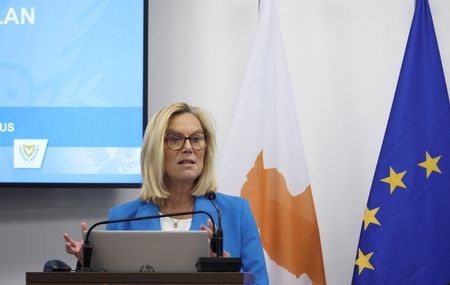BEIRUT (Reuters) -French President Emmanuel Macron called on Israel on Friday to accelerate its troop withdrawal from southern Lebanon, as a deadline nears for the pullout under the terms of a ceasefire that ended the war with Hezbollah last year.
Speaking during a visit to Beirut, Macron also said Lebanon’s military must have a total monopoly on weapons, and he voiced France’s support for strengthening the Lebanese army’s deployment in the south.
“We need a total withdrawal of the Israeli army,” Macron said, speaking alongside Lebanon’s new president, Joseph Aoun, who commanded the Lebanese military until parliament elected him as head of state on Jan. 9.
“We support… the increased power of the Lebanese armed forces and their deployment in the south,” the French president said. “The Lebanese armed forces constitute a pillar of the sovereignty of Lebanon.”
Macron is the first foreign head of state to visit since Aoun was picked to fill the vacant post of head of state. His appointment signalled a shift in the country’s power balance after Iran-backed Hezbollah was left deeply weakened by its war with Israel.
The ceasefire, which took effect on Nov. 27 and was brokered by the United States and France, requires Israeli forces to withdraw from southern Lebanon within 60 days, and for Hezbollah to remove all its fighters and weapons from the south.
U.N. Secretary General Antonio Guterres, also speaking during a visit to Lebanon on Friday, said the Israeli military’s continued occupation of territory in southern Lebanon and the conduct of military operations in Lebanese territory were violations of a U.N. resolution upon which the ceasefire is based.
“They must stop,” he said.
Addressing U.N. peacekeepers in southern Lebanon, he also said UNIFIL had uncovered more than 100 weapons caches belonging to Hezbollah or other armed groups since the ceasefire took effect.
Israel inflicted big blows on Hezbollah in the war that ran parallel to the Israel-Hamas war in Gaza, killing many of its leaders including Hassan Nasrallah. The group was dealt another blow when its Syrian ally President Bashar al-Assad was ousted last month, cutting its overland supply route to Iran.
The election of Aoun, who has U.S. and Saudi backing, was followed this week by the designation of Nawaf Salam as prime minister, against the wishes of Hezbollah, which wanted the incumbent Najib Mikati to remain in the post.
Paris has played a key role in helping break a longrunning political deadlock in Lebanon, along with the U.S. and Saudi Arabia.
Macron said “the true, authentic Lebanon has returned”, and Aoun’s election represented the possibility of a new path.
Aoun stressed the “importance of consolidating the ceasefire and Israel’s withdrawal”, the Lebanese presidency posted on X.
He also called on Macron to ask TotalEnergies to resume offshore energy exploration in Lebanese waters. TotalEnergies is part of a consortium including Italian energy group Eni and state-owned QatarEnergy.
SOVEREIGNTY AND REFORM
As a former French protectorate, Beirut has strong historical ties with Paris, but the relationship has been complicated in recent years.
Macron expended considerable political capital in 2020 when he tried unsuccessfully to persuade Lebanese actors to back political and financial reforms after a port explosion in Beirut that killed more than 200 people and inflicted major damage on the city.
A French presidency source who briefed reporters ahead of this trip said the objective was to underscore the importance of Lebanon’s sovereignty, help it towards structural economic reforms that would restore international confidence and ensure there is a united government able to push change.
Macron also spoke to Saudi Crown Prince Mohammed bin Salman ahead of the visit. Paris has sought to get Riyadh to re-engage in Lebanon for months and the arrival of Aoun to the presidency and Salam as prime minister has helped that process.
French officials said they were optimistic Saudi Arabia would provide financing and equipment to beef up the Lebanese Armed Forces.
(Reporting by John Irish, Elizabeth Pineau, and Dominique Vidalon in Paris, Laila Bassam in Beirut, Clauda Tanios in DubaiWriting by John Irish and Tom PerryEditing by Gareth Jones and Frances Kerry)











